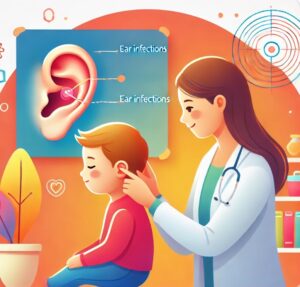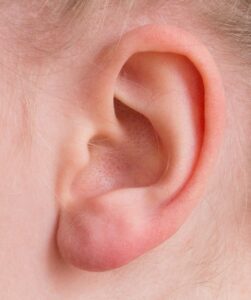When a child wakes up crying with ear pain at night, it can be scary and confusing for parents. Should you rush to the hospital right away, or is it safe to wait? In this guide, we explain common causes of ear pain, signs that need urgent care, and how to comfort your child at home.
Common Causes of Ear Pain in Children
Ear pain (also called earache) can happen for many reasons. Some of the most common causes include:
- Middle ear infection (otitis media): This happens after a cold or upper respiratory infection. Fluid builds up behind the eardrum, causing pain, fever, and sometimes hearing loss.
- Outer ear infection (swimmer’s ear): Water trapped in the ear canal can cause redness, swelling, and tenderness.
- Earwax blockage: Too much earwax or a foreign object can create pressure and pain.
- Throat infections or teething: Sometimes, pain from a sore throat or teething is felt in the ear.
Understanding the cause can help you decide whether hospital care is needed.
When to Take Your Child to the Hospital for Ear Pain
You should seek medical care immediately if your child shows any of these warning signs:
- Severe ear pain that does not improve and makes your child very upset
- High fever, especially above 101.5°F (38.5°C)
- Fluid or pus leaking from the ear (especially if bloody or foul-smelling)
- Hearing problems like not responding to sounds
- Dizziness, vomiting, or unusual sleepiness
- Ear pain after a head injury
These symptoms might indicate a serious infection, a ruptured eardrum, or other urgent problems that need quick treatment.
When You Can Manage Ear Pain at Home
If your child’s ear pain is mild, you can usually manage it at home if:
- The child is still eating, drinking, and playing normally
- There is no high fever (temperature below 100.4°F or 38°C)
- There is no ear discharge
- The child is not dizzy or extremely sleepy
Home Care Tips for Mild Ear Pain
- Give appropriate doses of acetaminophen or ibuprofen for pain relief (check the package for correct dosage)
- Apply a warm compress gently over the sore ear (be careful it's not too hot)
- Keep the child's head slightly elevated
- Prevent water from entering the ear during baths
Always keep an eye on symptoms. If pain worsens or lasts longer than 24 hours, contact your child’s doctor.
How to Tell If Ear Pain Is Serious
Ask yourself:
- How long has the pain lasted? If severe pain continues beyond two hours, it’s safer to see a doctor.
- Are there any serious symptoms? High fever, ear discharge, or behavior changes are warning signs.
- Does your child have a history of ear infections? If yes, be more cautious and seek medical advice early.
Untreated ear infections can lead to hearing loss, which can affect speech and learning. It's important not to delay care if you're unsure.
How to Prevent Ear Infections and Ear Pain
You can reduce your child's risk of ear infections by:
- Teaching your child to blow their nose gently
- Drying ears carefully after swimming or bathing
- Avoiding cotton swabs inside the ears
- Staying up to date with recommended vaccines, such as the pneumococcal and flu vaccines
Good habits can make a big difference in keeping little ears healthy!
Final Thoughts
If your child has ear pain at night, stay calm and check for serious symptoms. Mild earaches can often be cared for at home, but severe pain, high fever, discharge, or changes in behavior mean it’s time to head to the hospital.
When in doubt, trust your instincts and contact a healthcare professional. Early treatment helps protect your child's hearing and overall health.












